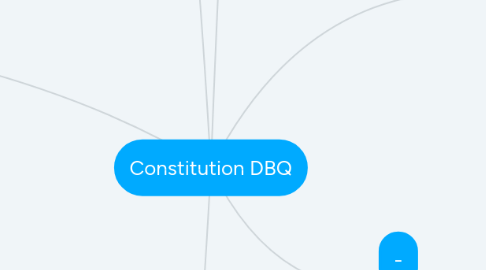
1. Madison believed that the government would thrive with the people’s input and votes instead of other legislators
2. -
3. Was the constitution a counter revolution against excess of democracy?
3.1. Excess of democracy: the decision making isn’t quick or efficient because so much time and effort goes into equal decision making that it doesn’t get done in time.
3.2. To update and improve upon the articles of confederation
3.2.1. Original document meant to keep america from the British type monarchy
3.2.2. Weakness being all states had to agree to ratify to something and taking too long and also being rare that all states would agree
3.2.3. Document B
3.2.3.1. Every state can join each other when. In time of war and also can make their own allies. Which could result in war.
3.2.3.1.1. Each state had troops that were controlled by the state not a country troop
3.2.3.2. Congress has rule over most things almost like a parental relationship
3.2.3.3. The articles do not talk about full country unity, what the constitution strives for
3.2.3.4. Articles written by rich white men becuase of no talk about women or African Americans
3.2.4. -
3.3. A counter revolution in a positive sense of governing the established freedom and forming laws/boundaries to deter from anarchy
3.3.1. Not against the excess of democracy but to reform it so it isn’t as prevalent
4. What happened before 1787?
4.1. Stars and Stripes were added to flag on June 14, 1777
4.1.1. Showed countries growing unity and need for a peaceful government
4.2. Articles of confederation adopted by Continental Congress November 15, 1777
4.3. Articles of confederation ratified in 1781
4.4. Treaty of Paris signed 1782
4.5. Revolutionary war ends 1783
4.6. Delegates met in Maryland to write constitution September 11-14 1786
4.7. Shay rebellion occurs in Massachusetts January 25 1787
4.7.1. Believe that the people will get persuaded and can’t make unbiased decisions on certain government branches.
4.8. Northwest ordinance of 1784, 1785, 1787
4.9. Constitutional convention in Philadelphia independence hall on may 25 1787
4.10. Great compromise was made on July 5 1787
4.10.1. Mason wants more than one branch of government elected by people called House of Commons
4.10.2. Document E
4.10.2.1. Records of the federal convention of 1787 (federalist POV)
4.10.2.2. -
4.10.2.3. National legislation should be chose by the people from several states
4.10.2.4. Because of shays rebellion it shows us that people are misled into baneful measures
4.10.2.5. Aims to fulfill the rights of everyone
4.10.2.6. Wilson says that no government can survive without the people
4.11. Constitution was adopted to congress on September 17 1787
5. What political movement led to writing the constitution in 1787?
5.1. Shays rebellion on January 25 1787
5.1.1. Made people realize that they needed a strong government to be able to regulate laws
6. The political battle over ratification/ governing document that compromised between 2 extreme parties
6.1. Federalist
6.1.1. Wanted the constitution ratified
6.1.2. Power to the people (federalism)
6.1.2.1. Document A
6.1.2.1.1. Written in 1776 by Virginia
6.1.2.1.2. Many points in their own bill of rights made it into the final one in the constitution as well as some things mentioned in the Declaration
6.1.2.1.3. -
6.1.3. James Madison, Alexander Hamilton, James Jay, Benjamin Franklin, George Washington
6.1.3.1. -
6.1.3.2. Document C
6.1.3.2.1. Written by Ben Franklin
6.1.3.2.2. Says that this type of government is too perfect and he expects nothing less
6.1.3.2.3. He thinks a general government is necessary
6.1.3.3. Document D
6.1.3.3.1. Written by George Washington
6.1.3.3.2. Admits the faults in the country and in the articles of confederation
6.1.3.3.3. Congress can’t hurt the people without hurting themselves too
6.1.3.3.4. Says how we are apt to run to one extreme to another
6.1.3.3.5. Believes that the people cannot fully govern themselves alone so we must take measures to make sure our ideals aren’t far fetched and also to avert the possible consequences
6.2. Antifederalists
6.2.1. Did not want the constitution to be ratified and would only ratify it with the addition of the bill of rights
6.2.2. Rich and educated men who hold office
6.2.3. Document F
6.2.3.1. Said that the bill of rights was never needed as much as it does in this government
6.2.3.2. Asks how the people’s rights are represented in the constitution
6.2.3.3. References the articles of confederation
6.2.3.3.1. Every right goes to the states unless declared in the articles of confederation
6.2.3.4. Saying the the constitution is giving the congress power over you but you do not get any power over them
6.2.3.5. -
6.2.3.6. -
6.2.4. -
6.2.5. Patrick Henry, George Mason, Thomas Jefferson
6.2.6. -
6.2.7. -
6.2.8. Less educated and lower class
6.2.8.1. Usually farmers or tradesmen facing taxations
6.2.9. Thought each state should have its own type of government
